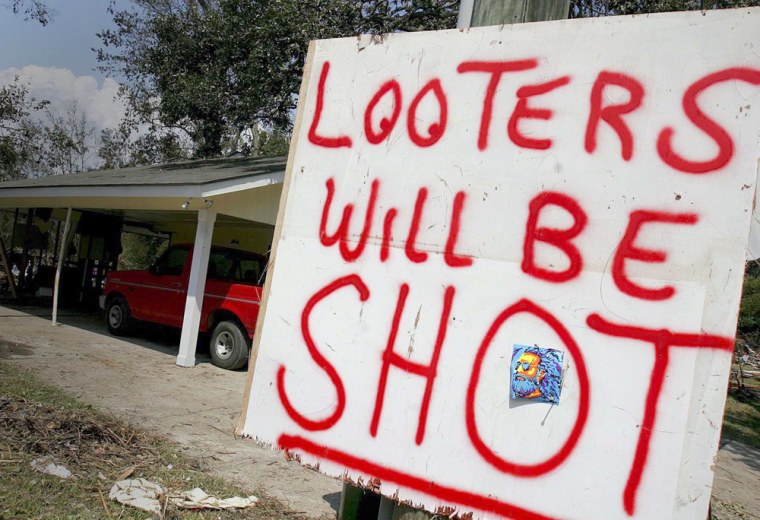As New Orleans has descended into chaos, desperate residents have stolen ramen noodles, loaves of bread, cases of soda — basic survival needs in a painfully empty city. Others have taken jewelry, TVs and even guns.
The devastation left behind by Hurricane Katrina has raised difficult questions of ethics: When, if ever, is looting OK? When is it acceptable to break the law — and what happens when law itself breaks down?
In New Orleans on Thursday, Monica Laguard sobbed almost uncontrollably as she placed items she had taken from a store’s shelves into plastic garbage bags to take them to her shelter in a nearby school.
She was taking children’s clothing and snack foods. She could not find water.
“I’ve got to get back to my children,” she said. “I’ve got to get back to my children.”
Drawing an ethical line
Ethicists and social psychologists said in interviews that rules of human behavior — including respect for others’ property and for social order itself — dissolve quickly in desperate circumstances like the storm’s aftermath.
“Obviously stealing things like TV sets or beer or any items that aren’t crucial for survival, that’s a nonstarter,” said Mark Bernstein, a professor of applied ethics at Purdue University. “There would be no ethicist in the country that would think that’s proper behavior.”
But he quickly made an analogy: If the only pharmacy nearby were closed, and it had a drug your mother needed to stay alive, breaking into the pharmacy would be the right thing to do."
“If it’s truly for survival — and I emphasize that, really for your children or wife — I think you have an obligation to your family that is at least as strong as the respect you have to pay other property owners,” he said.
Life-and-death struggle
In the cauldron of lawlessness that is New Orleans, these ivory-tower hypotheticals are being played out with life-or-death consequences.
Outside a Rite-Aid pharmacy where thieves had commandeered a forklift and used it to push up the storm shutters and break the glass, a woman on a bicycle rode up Thursday and asked whether police were making arrests inside. Told no, she said, “I’m a diabetic. I need test strips. I’m down to two. I don’t know if my insulin’s any good. It hasn’t been on ice.”
Carrying toothpaste, toothbrushes and mouthwash, Earl Baker walked up to a reporter and said: “All of this is personal hygiene. I ain’t getting nothing to get drunk or high with.”
In the first days after New Orleans flooded, local police took a relatively relaxed attitude toward refugees stealing food, water and other necessities. The police chief and mayor said they understood people were trying to survive.
City reverts to ‘state of nature’
But as the looters have grown more brazen, law enforcement has begun to crack down, especially when thieves have taken guns or preyed upon innocent people with food and water.
By Thursday, National Guard, state and local police were deployed from search-and-rescue operations specifically to restore order to the city.
Jan Boxill, associate director of the Parr Center for Ethics at the University of North Carolina, draws a clear line: Looting on its face is wrong because it’s stealing.
But she said New Orleans appears to have regressed into what ethicists call the state of nature — an atmosphere without rules or infrastructure, where the needs are so great that anything goes.
“It isn’t that it justifies it,” she said, “but where there’s no laws that can help anybody, one way or the other, obviously people need what they need to survive.”
Some of the looters marauding through the city have clearly gone beyond survival needs. On New Orleans’ Canal Street, dozens of looters ripped open the steel gates on clothing and jewelry stores and grabbed merchandise. At a Wal-Mart, looters brazenly filled shopping carts with microwave ovens, coolers and knife sets. Some walked out of a sporting goods store with armfuls of football jerseys.
And, most terrifyingly, looters have been breaking into stores all over New Orleans and stealing guns. New Orleans’ homeland security chief said gangs of armed men are moving around the city, in some cases shooting at police.
Jonathan Haidt, a social psychologist at the University of Virginia, said some people might see widespread looting and not want to be left out — to “feel like a sucker.”
He compared it to sitting in traffic and watching people zoom past on the shoulder of the road: “We curse that person. But then another person goes by, and another, and we say, ‘If everyone else is doing that, I’m going to, too.”’
